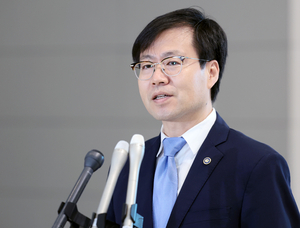 Yeo Han-koo, South Korea’s Trade Minister for Trade Negotiations, speaks to reporters at Incheon International Airport Terminal 2 on June 22, before departing for the United States for trade talks on tariffs. (Yonhap)
Yeo Han-koo, South Korea’s Trade Minister for Trade Negotiations, speaks to reporters at Incheon International Airport Terminal 2 on June 22, before departing for the United States for trade talks on tariffs. (Yonhap) South Korea will join hands with Cambodia to distribute electric motorcycles and charging stations in the Southeast Asian nation, marking Seoul’s first-ever international carbon emission reduction project, the industry ministry said Monday.
The project, aimed at reducing 680,000 tons of carbon emissions in Cambodia, is South Korea’s first international carbon reduction initiative established under the Paris Agreement, according to the Ministry of Trade, Industry and Energy. The project was officially approved by the Cambodian government Friday.
Under the Paris Agreement, a host country can sell internationally transferred mitigation outcomes, or carbon credits, to a buyer country in exchange for investments, support for carbon reduction capacity building and access to related technologies.
Of the 680,000 tons of projected carbon reductions, carbon credits worth 400,000 tons will be transferred to Korea and used for the country’s nationally determined contribution for achieving carbon neutrality, the ministry explained.
South Korea has pledged to reduce its greenhouse gas emissions by 40 percent from 2018 levels by 2030 and to achieve carbon neutrality by 2050.
The ministry said Seoul will also work to expand cooperation with Phnom Penh in the transportation sector to further reduce carbon emissions.
“This project is Korea’s first internationally approved carbon reduction initiative,” an official at the ministry said.
“By combining Cambodia’s commitment to carbon reduction with the technological expertise and investment of Korean companies, the project can evolve into a win-win intergovernmental cooperation model for the two countries.” (Yonhap)
